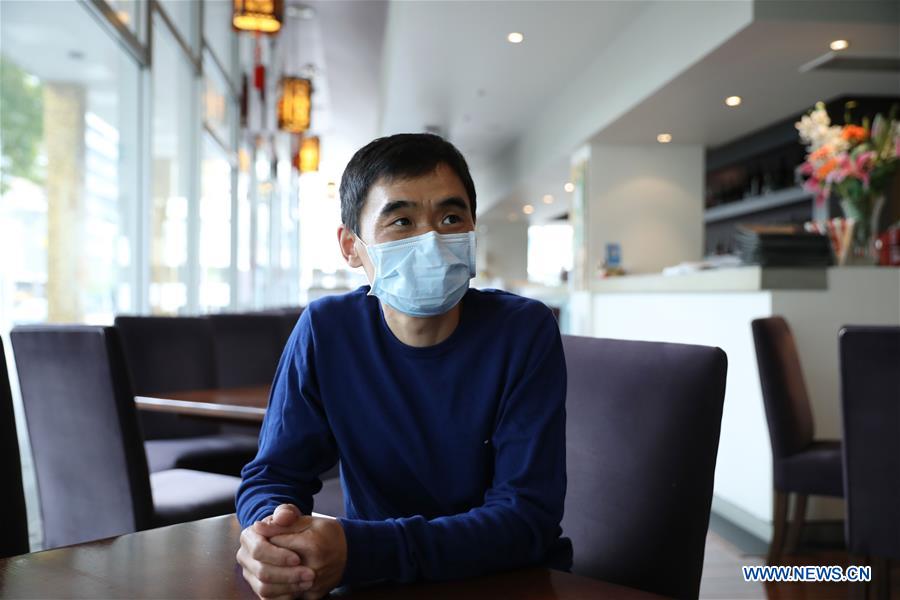
He Wei, owner of a Chinese restaurant, is interviewed in Canberra, Australia, March 28, 2020. (Photo by Chu Chen/Xinhua)
by Xinhua Writers Bai Xu, Yue Dongxing
CANBERRA, March 30 (Xinhua) -- It was lunchtime when He Wei closed and locked the doors of his restaurant at the center of Australian capital Canberra.
"The restaurant has been open for seven years, and never have I thought before that one day I would have to shut it down without knowing when to reopen," he said.
He, 36, is owner of Mr. Wei's, one of the most popular Chinese restaurants in Canberra with its signature Beijing Roast Duck.
Adjacent to the shopping mall Canberra Center and performing arts venue Canberra Theater Center, Mr. Wei's was always bustling with customers, most of whom local Australians.
Things began to change after the outbreak of COVID-19.
"The epidemic first hit China, and I was concerned about my parents, brothers and sisters," He recalled, adding that he followed news reports every day.
"We are a Chinese restaurant and our staff are Chinese. So we wanted to do something for our mother country," said He. They decided to donate some masks.
"We could only buy several or a dozen each time in a pharmacy," he said. But they managed to have them sent back to China.
When the situation in China improved, He had no time to rejoice, because he saw Chinese restaurants in Australia affected greatly by the epidemic.
"There were irresponsible local media reports labeling COVID-19 as a 'Chinese virus' and ensuing stigma against Chinese people," he said. "Some locals stopped going to Chinese restaurants."
At the same time, as Australia closed the border to Chinese nationals, many people, especially students, were unable to come back after the Spring Festival. That means Mr. Wei's also lost its Chinese customers.
The last blow came on March 23, when the federal government of Australia announced that restaurants and cafes were restricted to takeaway and delivery only.
"We chose to close," He said. "It is not profitable for restaurants like us to do takeaway."
Looking into the future, the man was unsure. "I may have to close for a quarter, or even two. I am afraid we will have to lose up to half of the revenue this year."
Unlike him, Julie Wang is still working in her restaurant Xi'an Famous Food.
Graduated from a university in Melbourne, Wang partnered with some friends to open the restaurant about four months ago.
She told Xinhua that income nowadays was less than one third of that in the past.
Wang recently put up an advertisement on a local Chinese-language magazine, saying that the restaurant would offer a 15 percent discount.
"I have no expectation for the future," she said. "I do not want to be too pessimistic, and nor can I be optimistic under such circumstances. This is the first career I had and I really would like to carry on."
The Xi'an Famous Food is located in the Woolley Street of Dickson, which was dubbed the "China Town" of Canberra. The street, where one could hardly find a parking space in busy hours, is very quiet now.
The Chongqing Street Noodle is also in this street.
The brand, featuring the image of a granny cat, became popular after it was mentioned in Chinese documentary television series A Bite of China.
"Our restaurant had always been full since we opened in November 2018. Sometimes people waiting for a seat had to queue outside," said 33-year-old Jett Li, owner of the restaurant.
January was the slack season as many Chinese people went back to China for the Spring Festival family reunion, so Li closed the restaurant for two weeks.
"I was in my hometown Changsha when China saw the COVID-19 outbreak," he recalled. Changsha is the capital city of central China's Hunan province.
After he came back to Canberra, he found the slack season seemingly endless. His relatives, worried about the condition in Australia, asked him to go back to China.
"But I have to think of others in my restaurants," he said. "There used to be more than 10 full-time and part-time employees here. Apart from those who are still in China and some too afraid to come, we still have three or four here. They need this job."
They are now taking precaution while working, wearing masks and washing hands frequently.
"I think the measures by the Australian government are effective," Li said. "But I hope that they could emphasize more on people's self-protection. I know many residents here are still not wearing masks, which is not only used to protect others, but also yourselves as well."
Ms. Wang from the Xi'an Famous Food said she wished the government could offer more aid to small businesses like them. "My landlord has kindly reduced the rent, but that is not enough."
She is not the only one with such a wish. As of Monday morning, Australia has confirmed 4,093 COVID-19 cases. Public places such as cinemas, museums, galleries, gyms and libraries are closed, while public gatherings are limited to two people to slow the spread.
According to the Sydney Morning Herald, more than 2 million Australians could be out of work in the country, where the population stands at about 25 million.
To date, the Australian government has unveiled three economic stimulus packages. But it takes time for policies to be implemented and money distributed.
He Wei is paying his four full-time employees with the spare money accumulated in the past.
Speaking of his home country, He said "China has the experience in controlling spread of the epidemic and I hope that Australia could learn from China in this respect."
"It is our hope that the crisis could end soon and people's life back to normal," he said. "They could again watch the plays in the theater, go shopping in the emporium, and dine in our restaurant."